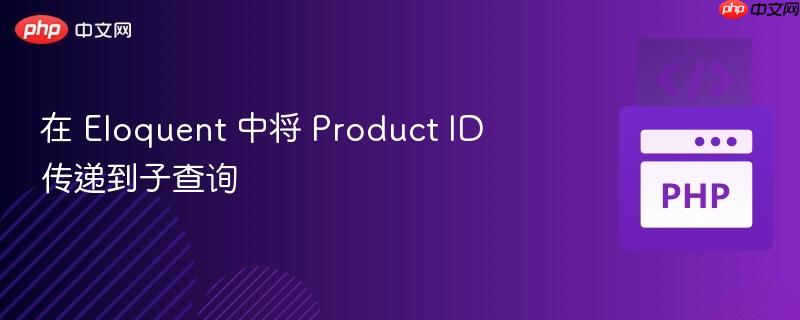
本文将指导你如何在 Laravel Eloquent 中将 Product ID 传递到子查询,以优化数据查询效率。我们将通过一个实际案例,展示如何利用 Eloquent 的关系方法,避免不必要的循环和手动过滤,最终实现更简洁、高效的数据获取方式。
利用 Eloquent 关系进行高效查询
在 Laravel 中,Eloquent ORM 提供了强大的关系映射功能,可以帮助我们轻松地处理数据库表之间的关联。当我们想要获取某个 Product 及其关联的 Locals 和 Presentations 时,可以充分利用这些关系,避免手动循环和过滤。
示例代码
以下代码展示了如何使用 has() 方法和 with() 方法,结合 Eloquent 关系,实现高效的数据查询:
$products = Product::has('locals.presentations')
->with(['locals' => function ($locals) {
$locals
->select('locals.id', 'descripcion')
->with(['presentations' => function ($presentations) {
$presentations->select(
'presentations.local_id',
'presentations.product_id',
'presentations.id',
'presentation',
'price'
);
}]);
}])->select('products.id', 'nombre')->get();代码解释:
Product::has('locals.presentations'): 这部分代码确保只选择那些拥有关联的 locals 和 presentations 的 products。 has() 方法接收一个关系链作为参数,它会检查是否存在满足该关系链的记录。
->with(['locals' => function ($locals) { ... }]): 这部分代码预加载了 locals 关系。with() 方法允许我们指定一个闭包函数来进一步约束查询。
$locals->select('locals.id', 'descripcion'): 在 locals 查询中,我们使用 select() 方法只选择需要的字段,提高查询效率。
->with(['presentations' => function ($presentations) { ... }]): 这部分代码预加载了 presentations 关系,同样使用闭包函数来约束查询。
$presentations->select(...): 在 presentations 查询中,我们同样使用 select() 方法只选择需要的字段。
->select('products.id', 'nombre'): 最后,我们在 products 查询中也只选择需要的字段。
->get(): 执行查询并获取结果。
注意事项:
- 确保在 Product 和 Local 模型中正确定义了关系。如果关系设置正确,Eloquent 会自动处理 product_id 的匹配,无需手动传递。
- has() 方法可以显著提高查询效率,因为它避免了加载所有 Product,然后再过滤掉没有关联 Locals 和 Presentations 的 Product。
- select() 方法可以减少数据库传输的数据量,进一步提高查询效率。
- hasManyThrough 关系需要仔细配置,确保中间表和目标表的外键关系正确。
模型关系定义
确保你的 Product 和 Local 模型中定义了正确的关系。
Product 模型:
public function locals()
{
return $this->belongsToMany(Local::class)->using(LocalProduct::class)
->withPivot(['id', 'is_active'])
->withTimestamps();
}Local 模型:
public function presentations()
{
return $this->hasManyThrough(
Presentation::class,
LocalProduct::class,
'local_id',
'local_product_id'
);
}总结
通过使用 Eloquent 的 has() 和 with() 方法,结合正确的模型关系定义,我们可以高效地将 Product ID 传递到子查询,避免手动循环和过滤,从而简化代码并提高查询效率。记住,理解 Eloquent 的关系映射是编写高效 Laravel 代码的关键。





























